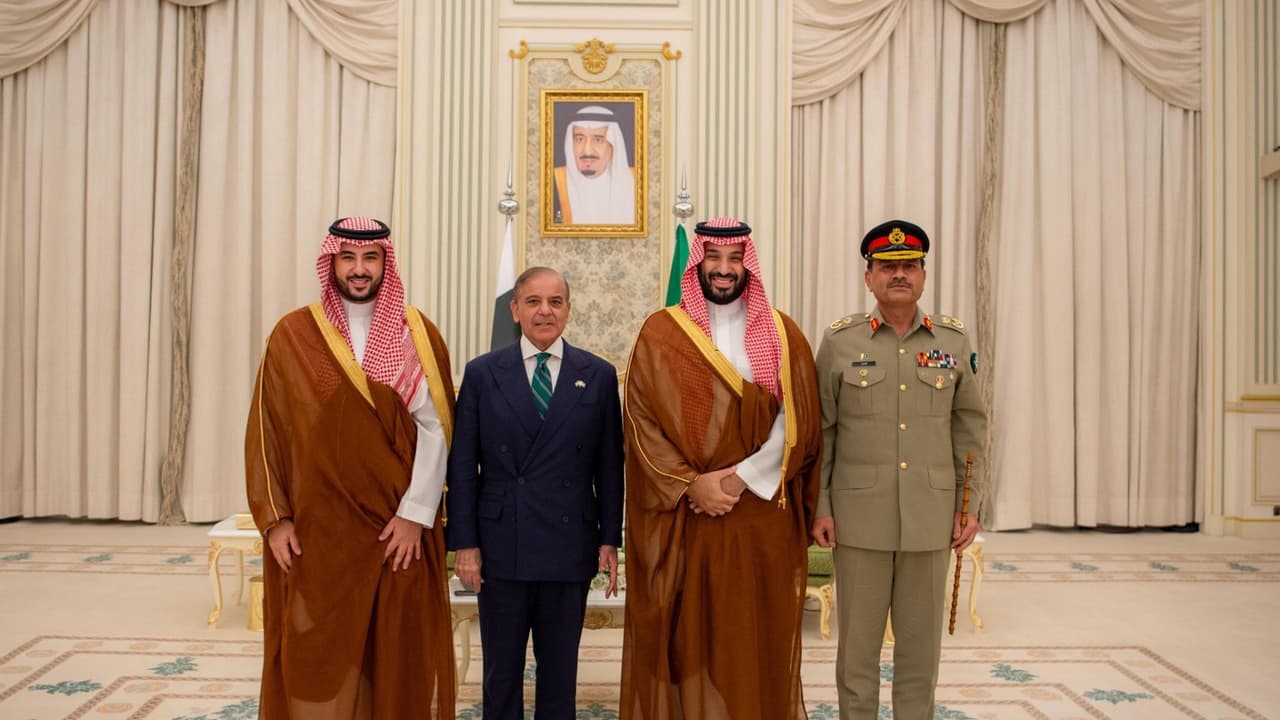Pakistan and Saudi Arabia sign a strategic defence pact declaring “any aggression against either is aggression against both.” Experts warn of potential regional risks and indirect nuclear implications for India’s security.
New Delhi: Pakistan and Saudi Arabia have formalised a long-standing defence and security partnership with a strategic mutual defence pact signed in Riyadh this week. The agreement declares that “any aggression against either country shall be considered an aggression against both,” marking a new chapter in relations between the two nations.
The pact was signed by Pakistan Prime Minister Shehbaz Sharif and Saudi Crown Prince Mohammed bin Salman, the kingdom’s de facto ruler. Pakistan’s army chief, Field Marshal Asim Munir, was also present during the signing. Pakistani Defence Minister Khawaja Muhammad Asif emphasised that nuclear weapons were “not on the radar” of the pact, adding, “We have no intention of using this pact for any aggression. But if the parties are threatened, then obviously this arrangement will become operative.”
The agreement, concluded soon after the Arab-Islamic emergency summit in Doha, is said to be the culmination of decades of sustained dialogue between Riyadh and Islamabad. Khawaja Asif also noted that the pact could eventually be extended to include other Gulf nations.
Scroll to load tweet…
Experts Highlight Potential Nuclear Implications
India is watching the development closely, with experts highlighting potential implications for regional security. Major General Ashok Kumar (Retd), director general of the Centre for Joint Warfare Studies (CENJOWS), explained the backdrop:
“India has displayed an unparalleled victory over Pakistan during the first phase of Operation Sindoor. During this, a kind of informal grouping emerged wherein China and Turkiye also bandwagoned with Pakistan.”
He noted that while Saudi Arabia has long been a known friend of Pakistan, India also enjoys “an excellent relationship” with Riyadh.
“It’s a natural cause of worry for India if more countries align with Pakistan irrespective of the kind of support they can provide. Saudi Arab is a known friend of Pakistan since long but India also enjoys an excellent relationship with Saudi Arab,” he said.
“While the current state of Saudi Arab – Pakistan was normal, the defence pact signed on Wednesday between both the countries is a matter of concern for India, especially given the unending hostility of Islamabad towards New Delhi,” Ashok Kumar added.
Discussing the military implications, he added, “The pact may not add much military value to Pakistan given the limited military strength of Saudi Arab but it provides indirect availability of nuclear weapons to Saudi Arab.”
Another expert highlighted the strategic angle, stating, “The defence pact effectively marries Riyadh’s money with Pakistan’s giant nuclear-armed military.”
Scroll to load tweet…
India’s Diplomatic Response
India’s Ministry of External Affairs has adopted a measured tone. During the weekly press briefing, spokesperson Randhir Jaiswal said, “India and Saudi Arabia have a wide-ranging strategic partnership that has deepened considerably in the last few years. We expect that our strategic partnership will keep in mind ‘mutual interests’ and ‘sensitivities’.”
While the pact is largely seen as a symbolic consolidation of Pakistan-Saudi ties, the potential for wider Gulf involvement and the indirect nuclear implications have made it a subject of careful scrutiny in New Delhi.
